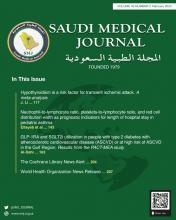To the Editor
We read with interest the study by Alfaifi et al1 on the use of extracorporeal shockwave therapy and therapeutic ultrasound in treating trigger finger (stenosing tenosynovitis).1 We have 3 comments.
The first is that both The British Society for Surgery of the Hand and The American Academy of Orthopaedic Surgeons do not recommend the use of extracorporeal shockwave therapy and therapeutic ultrasound in treating trigger finger.2,3 The treatments recommended by both organizations include: avoiding activities that provoke pain, using a splint, stretching exercises, local corticosteroid injections, percutaneous trigger finger release with a needle or surgical decompression of the tendon tunnel.
The second is that the 2 therapeutic interventions are labor intensive and time consuming involving 10 sessions within 5 weeks. The cost effectiveness of these treatments need to be compared to local corticosteroid injections (up to 2) which have been found to be most cost effective compared to other therapies including surgery.4
The third point is comparison should have been made with patients who have refused therapy or against local corticosteroid injections. Schofield and Citron reported on the natural history of adult trigger thumb in 26 patients, who refused treatment.5 In all of the 26 patients, the condition resolved spontaneously after an average duration of symptoms of 6.8 months (range 2–15). There was a small but non-functional reduction in movement of the thumb in some of the patients: 6 lost an average of 7° of abduction and 10 had an average loss of opposition of 1.4 (Kapandji grade). Because of the length of therapies using extracorporeal shockwave therapy and therapeutic ultrasound was 5 weeks, a significant number of these patients may have improved spontaneously in spite of the treatment used.
More robust, comparative, cost effective studies are needed to assess any therapeutic intervention.
Farrah Jawad
Department of Sports and Exercise Medicine
Homerton University Hospital, Homerton Row
London, United Kingdom
Ali S. Jawad
Department of Rheumatology
Royal London Hospital
London, United Kingdom
Reply from the Author
No reply was received from the Author.
- Copyright: © Saudi Medical Journal
This is an Open Access journal and articles published are distributed under the terms of the Creative Commons Attribution-NonCommercial License (CC BY-NC). Readers may copy, distribute, and display the work for non-commercial purposes with the proper citation of the original work.






